Brewing up Sales with Soaps and Lotions Selling Soaps and Lotions at Soap Shops |
|
|
|
By Sara Hodon Small-batch soap manufacturers with retail operations have two distinct advantages: customers love handmade items, whether they are shopping for themselves or for someone else, and personal care products like soaps and lotions are historically strong sellers. Combine these two elements and you are practically guaranteed profitability. 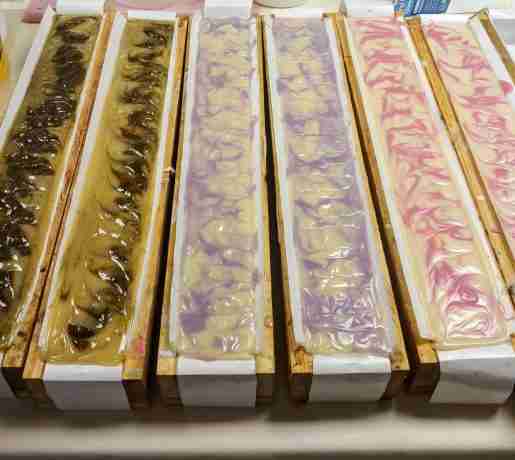 Fresh poured soap at Barb’s Homemade Soap and More. The Adrian, Mich., operation occupies 2,700 square feet, including the shop and classroom space. Fresh poured soap at Barb’s Homemade Soap and More. The Adrian, Mich., operation occupies 2,700 square feet, including the shop and classroom space.Yet small-batch soapmakers say their livelihoods are first and foremost labors of love which they’ve turned into successful retail ventures. Like any business, so much of its success depends on the owner’s willingness to put in the time and resources to get it operational and keep it running. “You have to love it,” said Cindy Liquori, owner of Cindy’s Soap Cottage in East Windsor, Conn. “I put in 14-hour days, every day, and no vacations. It’s exhausting but I love it. My advice would be to stick to your passions because in the end it will pay off.” Being a soapmaker with a retail space is fulfilling, but challenging, too. Liquori said having her name on her products means she has extremely high standards for each and every bar of soap that sits on her shelves. “Everything with your name on it should be excellent,” she pointed out. “You have to know what you’re doing, and you have to be super ethical and honest.” As for her best-sellers, she said, “Surprisingly, although I do sell a lot of soaps, I recently started getting into fragrance blending. Body oils and perfumes are my biggest sellers. I offer a blending bar where I can customize body oils and perfumes.” 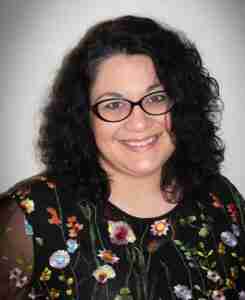 Marianne Rustad, owner of Conjured Soap Boutique in Jim Thorpe, Pa., said in a saturated market, finding a niche is important. Marianne Rustad, owner of Conjured Soap Boutique in Jim Thorpe, Pa., said in a saturated market, finding a niche is important.Marianne Rustad, owner of Conjured Soap Boutique in Jim Thorpe, Pa., said it’s important for those who want to turn their passion into a profitable business to find what makes you stand out. “You have to have a niche,” she stressed. “It is a very saturated market. You have to have something that sets you apart—something you don’t see often. Most soap makers are at craft fairs or farmers’ markets. I have a storefront and can set things up in a way that tells a story. That’s a unique opportunity. You really have to have a niche. Maybe you use certain ingredients in your products, or maybe you don’t use certain ingredients in your products …that’s what makes you special.” Rustad adds there are several requirements and conditions you have to meet in order to both make and sell these types of products. “You have to call the state Health Department. You have to be insured. I’ve been part of the Handcrafted Soap and Cosmetic Guild for five years, and when you become a member, you can get the insurance that covers you as a soapmaker. You can also do add-ons—if you want to teach, you have to be insured to teach, or to do private label products. A lot of people don’t realize there are a lot of things you have to do before you can sell soap.” And for retailers who want to work with small-batch soapmakers, she added, “If a retailer is looking to add a line of product, I would say make sure it represents the retailer’s shop and look they are going for. A retailer should make sure the products they are adding are made under the industry guidelines and should have a batch number.” Barb DeLosSantos, owner of Barb’s Homemade Soap and More in Adrian, Mich., has similar advice. “Natural and handmade soaps and lotions are no longer a rare find. ‘Natural’ and ‘handmade’ are becoming commonplace words, and to keep product popular and selling, you need to maintain the most popular items, then add seasonal inventory (fragrances, packaging, products, etc.),” she said. Some of her best-sellers are “’Shea Loves Me’, our everyday line of soaps and lotions made with essential oil blends are always the top sellers. Patchouli has a wonderful place in our top sellers list, and we have 17 products with patchouli in them. Lavender and lemongrass would also be on the top sellers list. With our younger market, soap made with bright colors tends to be popular.” 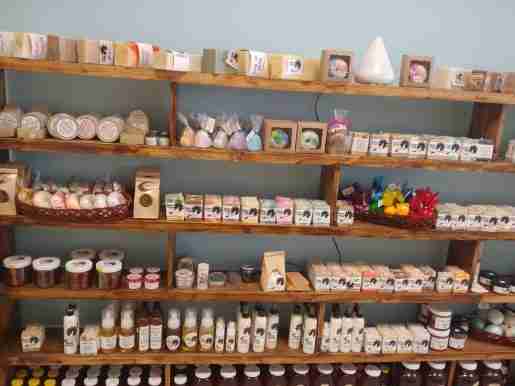 A soap display at Barb’s Homemade Soap and More. “Shea Loves Me,” a line of soaps and lotions made with essential oil blends, are top selling for the store. A soap display at Barb’s Homemade Soap and More. “Shea Loves Me,” a line of soaps and lotions made with essential oil blends, are top selling for the store.DeLosSantos’ operation occupies 2,700 square feet, including the shop and classroom space. Speaking of products that stand out, Liquori’s biggest seller is her black soap made from charcoal and dead sea clay. “You use it like a mud mask,” she explained. “It’s good for conditions like eczema, psoriasis, and problem skin.” Her soaps are all olive oil-based, which is also good for different skin types. Her other best-sellers include whip shea butter, Bath Bombs for kids, and her line of CBD products. She said her products sell well without a “story,” but she said some of her customers aren’t familiar with “natural” soaps, so she has to educate them. “Sometimes people come in and they think the price is outrageous until they try it,” she said. And she is happy to answer customers’ questions and teach them more about her products. “I have a lot of signs up around my store. I explain what the product is and what’s in it. You have to be able to answer questions. For example, my CBD line is becoming a big part of my business, and people want to know about it. You have to know what you’re talking about.” Creating handmade products also gives soap makers the opportunity to engage with customers in a unique and special way. “People can come into our shop and see the soap being made,” said Christina Fye, who co-owns Maine Island Soap in Ellsworth, Maine, with her husband Russ. “I think handmade items are special because of the work that goes into them. Making soap takes awhile, but it’s worth it.” She said she usually makes around 200 bars at a time, and that process alone takes four to five hours. Cutting the batch into bars happens 24 hours later, then it cures for 30 days. 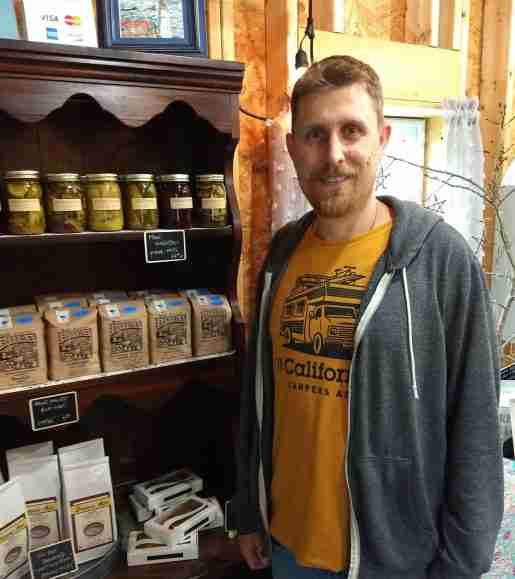 Maine Island Soap Co-Owner Russ Fye. The biggest sellers for the company are the Hadley Point Lavender Seaweed Soap and the Cadillac Mountain Hawaiian Mint Soap. Maine Island Soap Co-Owner Russ Fye. The biggest sellers for the company are the Hadley Point Lavender Seaweed Soap and the Cadillac Mountain Hawaiian Mint Soap.The Fyes said their biggest sellers are their Hadley Point Lavender Seaweed Soap and the Cadillac Mountain Hawaiian Mint Soap (“We put turmeric on the top of it so it kind of looks like a sunset,” Christina Fye explained). The Fyes’ storefront is a cozy 320 square feet, which lends itself to a more intimate shopping experience. Rustad has had the same positive interactions with her customers. “When people see into my kitchen and actually see the process and supplies, they get really excited. I am able to connect with my customers when explaining the process and even letting them watch on occasion. I also do not have wasted time. If traffic in the shop is slow, I can be in the kitchen making products and inventory.” Besides the products themselves, soap shop retailers said the product packaging helps to boost sales. “The packaging is what sells our soap,” Russ Fye said. “When we first started, our soap was just wrapped in tissue paper. We worked with a company in Portland called Pulp & Vine and redid our packaging. Now our boxes are vertical rather than horizontal, so they take up less shelf space, and our products come in different colored boxes.” DeLosSantos said it’s important to know your market so your products are packaged accordingly. “I package and display in several different formats depending on the type of retail location and the type of buyers. A local natural market may prefer bulk unwrapped bar, less waste and a very ‘primitive feel’—that’s what their buyers want. Gift shops are usually the opposite—they are looking for strong shelf presence, beautiful packaging and a draw to their gift-giving buyers. Sets and gift bags are popular. Stage your products to guide the customer to purchase similar or complementary products,” she pointed out.  Fresh poured soap at Barb’s Homemade Soap and More. The Adrian, Mich., operation occupies 2,700 square feet, including the shop and classroom space. Fresh poured soap at Barb’s Homemade Soap and More. The Adrian, Mich., operation occupies 2,700 square feet, including the shop and classroom space.And branding is another way to set products apart from other lines. Rustad’s brand—the name of her business, the products she makes and sells in her shop and the packaging they come in—is a combination of everything she loves. “I encompassed a little metaphysical, magic, supernatural, old world, and Victorian. I also love anything spooky, and Halloween-ish! I was able to work that into my brand and develop quality products that look like fun potions, and such,” she explained. The brand packaging for DeLosSantos’ line of “Shea Loves Me” soaps and lotions was inspired by the childhood rhyme “He loves me, he loves me not,” which little girls would say while picking petals off a flower. 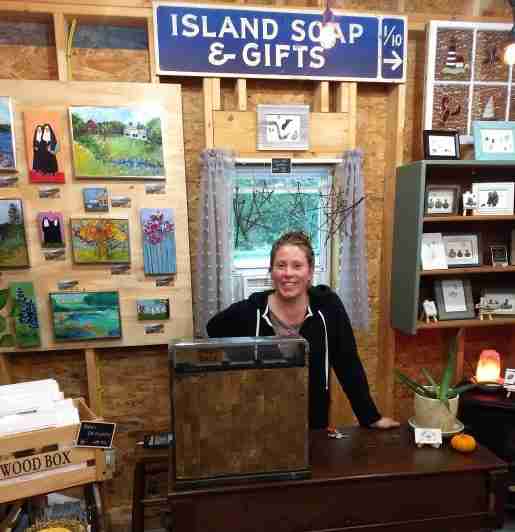 Christina Fye co-owns Maine Island Soap in Ellsworth, Maine, with her husband Russ. Customers visiting the shop can see the soap being made. Christina Fye co-owns Maine Island Soap in Ellsworth, Maine, with her husband Russ. Customers visiting the shop can see the soap being made.
Some retailers have expanded into a wholesale business. Rustad has a partnership with a local hotel and makes an exclusive line of soaps and personal care products for each of their guest bathrooms. The Fyes sell their soaps at the LL Bean store in nearby Freeport, Maine. There are countless ways to expand a “niche” business like handmade soap and personal care products. The key is to know your market, find a way to stand out, and always be open to new opportunities. DeLosSantos said, “Making handmade products is an art or skill you have to take the time to learn and perfect. Sell your products with pride. Share your skills where you can and respect others making and selling handcrafted items.” 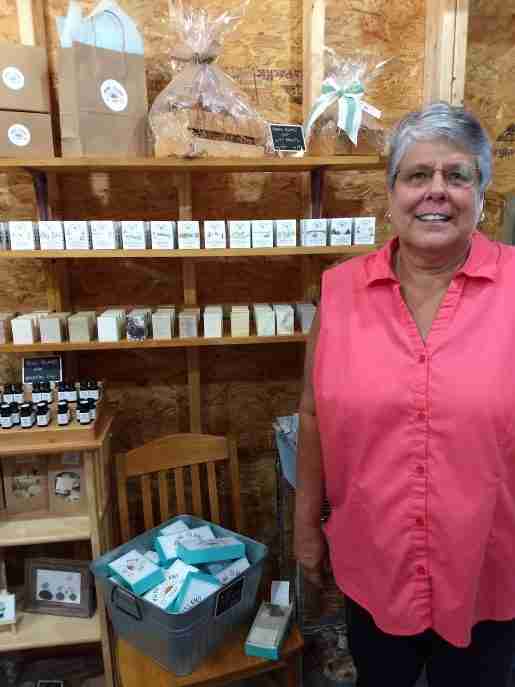 Maine Island Soap’s Co-Owner Russ Fye’s mother Helene Baker. The owners usually make around 200 bars of soap at a time. Maine Island Soap’s Co-Owner Russ Fye’s mother Helene Baker. The owners usually make around 200 bars of soap at a time. |
